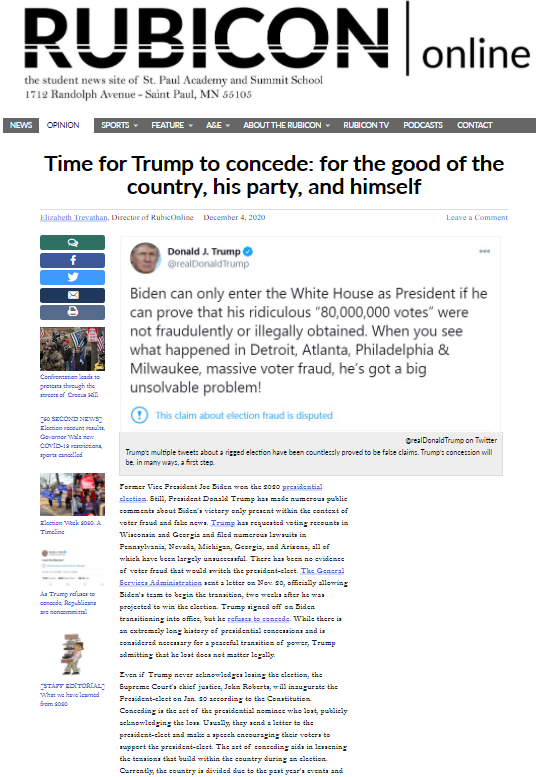December 4, 2020 – RubicOnline
Former Vice President Joe Biden won the 2020 presidential election. Still, President Donald Trump has made numerous public comments about Biden’s victory only present within the context of voter fraud and fake news. Trump has requested voting recounts in Wisconsin and Georgia and filed numerous lawsuits in Pennsylvania, Nevada, Michigan, Georgia, and Arizona, all of which have been largely unsuccessful. There has been no evidence of voter fraud that would switch the president-elect. The General Services Administration sent a letter on Nov. 20, officially allowing Biden’s team to begin the transition, two weeks after he was projected to win the election. Trump signed off on Biden transitioning into office, but he refuses to concede. While there is an extremely long history of presidential concessions and is considered necessary for a peaceful transition of power, Trump admitting that he lost does not matter legally.
Even if Trump never acknowledges losing the election, the Supreme Court’s chief justice, John Roberts, will inaugurate the President-elect on Jan. 20 according to the Constitution. Conceding is the act of the presidential nominee who lost, publicly acknowledging the loss. Usually, they send a letter to the president-elect and make a speech encouraging their voters to support the president-elect. The act of conceding aids in lessening the tensions that build within the country during an election. Currently, the country is divided due to the past year’s events and the political tensions that have grown since 2016. Trump acknowledging his loss has the potential to make the first step in healing the country. Biden has a long list of necessary clean-up to complete once he is President, including ending the COVID-19 pandemic and aiding the individuals impacted by it. Republicans and Democrats have polarized the pandemic by publicizing their different views. Trump encouraging his supporters to listen to the Biden administration’s recommendations would unify the country in a way that no one has seen in 2020. It would provide society with an element of togetherness.
Trump acknowledging his loss has the potential to make the first step in healing the country.
Conceding started in the late 19th century, and up to now, every President has accepted the result of the election and conceded. Trump is breaking the chain of peaceful transitions of power. In 2016, Hillary Clinton called Trump to concede. The 2000 election relied on a few hundred votes in Florida, and presidential candidate Al Gore conceded to presidential candidate George Bush when the results seemed to be precise. When the results tightened in Florida, Gore un-conceded to Bush before conceding again once the Supreme Court decided for Bush’s victory. Gore was also the vice president of Bill Clinton. Clinton’s administration allowed Bush to view the President’s daily brief and classified intelligence documents before the Supreme Court’s ruling, so Bush would be prepared if he did become President.
It takes time and money to prepare for a new president. New presidents are already crunched for time with the usual 70 days between the election and the inauguration. Security clearances need to pass. Every person needs to be prepared. The next administration needs to know all the policies and plans currently in process, and they need to be informed on the current state of foreign affairs. Waiting for the president-elect to join daily briefs and access intelligence documents is a risk to the U.S.’s security. It leads to the possibility of a foreign policy crisis in the early weeks of the next term since the new administration wouldn’t be prepared and knowledgeable about what the last administration has done. The GSA delayed Biden’s team’s access by two weeks, meaning for those two weeks, they didn’t have access to security briefings, federal agencies, or any funding to create a smooth transition.
The concession is a custom and is by no means required, but Trump’s refusal to concede shows the American citizens that the election is not secure. The Constitution is clear that at noon on Jan. 20, the president-elect, in this case, Biden, will take the oath of office even if Trump doesn’t concede. But Trump is still trying to change the results. He publicly insists that Biden’s victory is inaccurate and the result of fraud. Trump will continue to battle the election legally. Until the day that Trump concedes or Biden’s inauguration, there’s a tone of unsettledness on newspapers’ front page.
